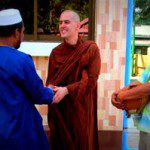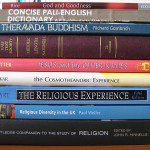As we pause on this day to reflect on the life and vision of Rev. Dr. Martin Luther King Jr. it’s easy to throw our hands up and admit defeat. Black men and boys are being killed by their neighbors and police with impunity, Muslims in the West face increasing scrutiny and bigotry, governments continue to ignore the wrongs of their nations past – and present – toward indigenous peoples, the latest boom in the economy seems to be just numbers on a screen for most Americans as 95% of recent income gains went to the richest 1%, and scientists now say that global warming will trigger a mass extinction of animals and this along with other human-caused destruction could lead to an earth that cannot support humanity as it does today.
Despite all of this, anyone who knows me knows that I’m an optimist about humanity. Do a quick search of this blog for “Pinker” and you’ll find some of my writings about recent work in optimism regarding humanity from a social scientific perspective. But my optimism goes back well before my familiarity with Steven Pinker, back to the tradition of Immanuel Kant (1724-1804), who is mentioned in the video below by Michael Shermer in his interview with fellow Patheos blogger Ryan Bell as one of the enlightenment thinkers who contributed to “the invention of human rights.”
In two of his essays, “Idea for a Universal History” (1784) and “Conjectural Beginning of Human History” (1786), Kant described the development of reason in human history as a gradual process, borne of instrumental use (in the service of satisfying basic needs), growing into antagonistic tensions, what Kant calls unsocial-sociability, in which people further developed their reason in competition with one another, and steadily building toward the kind of reason in which one might find it possible to follow the dictates of the Categorical Imperative: to truly treat all others as ends in themselves, to see the common humanity in all people. Kant even thought that our failings, our wars, our strife, and our struggles would further urge on the development of our rational nature, forcing us to learn less destructive ways to settle our differences. That tradition passed through people like the Transcendentalist and Universalist minister Theodore Parker, who inspired King’s quote in his fight for the abolition of slavery before the outbreak of the Civil War, saying:
I do not pretend to understand the moral universe; the arc is a long one, my eye reaches but little ways; I cannot calculate the curve and complete the figure by the experience of sight, I can divine it by conscience. And from what I see I am sure it bends towards justice.
That conscience, according to Kant, is the “moral law” within each of us, obscured only by various drives, desires, and inclinations that push and pull us this way and that. For Kant, a religious origin for this conscience was thin, if there at all. And according to Shermer, it was not so much a particular religious ideal that drove King but rather a liberal political idealism. He notes that a major influence on King was Gandhi and that many of the things King fought for were not in the Bible but rather reflected political needs of his day.
As Bell and Shermer further discuss the question of just how history could turn toward justice, the notion of the city-state came up, the idea that real decisions needed to be handled at the most local level possible. It is fitting, as this is just how so many movements in the drive for justice have arisen and found their momentum, and it is how thousands of protesters across the country today are marching, taking back the streets under the banners of #reclaimMLK and #BlackLivesMatter. Watch the video below, find events that are happening or have happened at fergusonaction.com/reclaim-mlk/, and let me know what you think: is the world becoming more just? Is there any such thing as an ‘arc’ to begin with, or is human history just an assemblage of random events pieced together by narratives of our own making?












